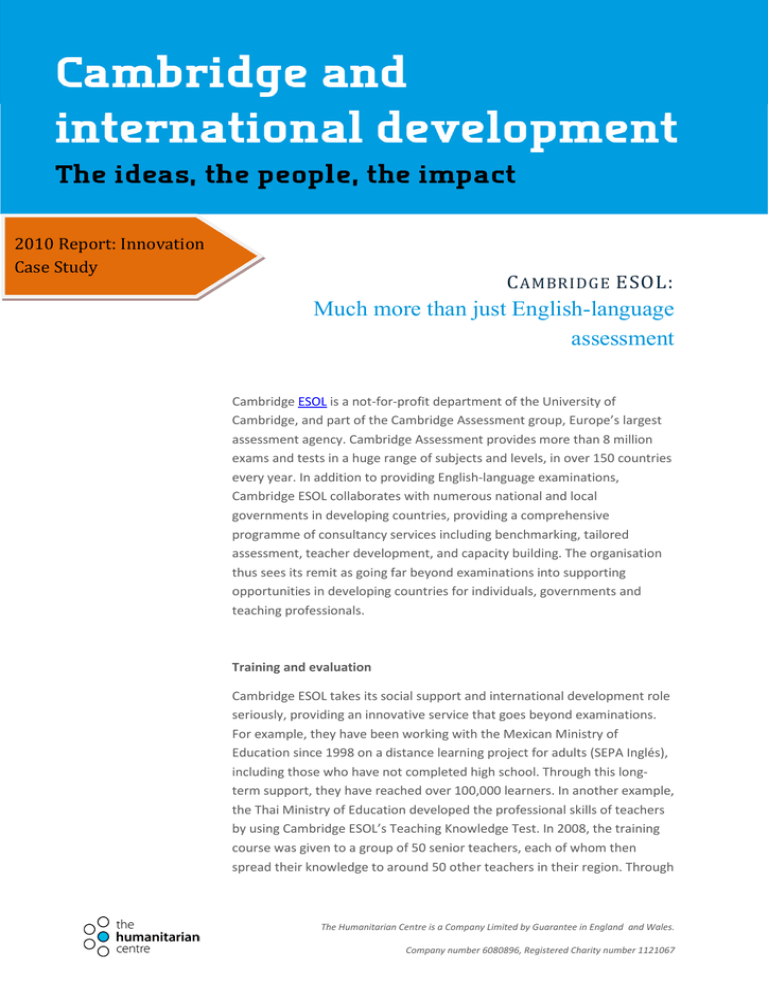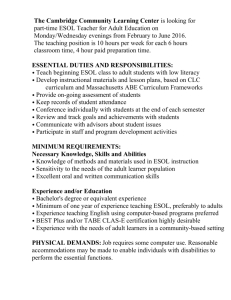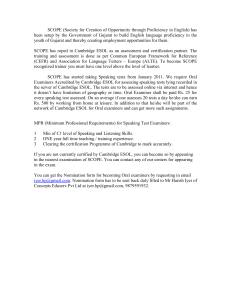Much more than just English
advertisement

Cambridge and International Development 2010: Innovation 2010 Report: Innovation Case Case Study Study C AMBRIDGE ESOL: Much more than just English-language assessment Cambridge ESOL is a not-for-profit department of the University of Cambridge, and part of the Cambridge Assessment group, Europe’s largest assessment agency. Cambridge Assessment provides more than 8 million exams and tests in a huge range of subjects and levels, in over 150 countries every year. In addition to providing English-language examinations, Cambridge ESOL collaborates with numerous national and local governments in developing countries, providing a comprehensive programme of consultancy services including benchmarking, tailored assessment, teacher development, and capacity building. The organisation thus sees its remit as going far beyond examinations into supporting opportunities in developing countries for individuals, governments and teaching professionals. Training and evaluation Cambridge ESOL takes its social support and international development role seriously, providing an innovative service that goes beyond examinations. For example, they have been working with the Mexican Ministry of Education since 1998 on a distance learning project for adults (SEPA Inglés), including those who have not completed high school. Through this longterm support, they have reached over 100,000 learners. In another example, the Thai Ministry of Education developed the professional skills of teachers by using Cambridge ESOL’s Teaching Knowledge Test. In 2008, the training course was given to a group of 50 senior teachers, each of whom then spread their knowledge to around 50 other teachers in their region. Through The Humanitarian Centre is a Company Limited by Guarantee in England and Wales. Company number 6080896, Registered Charity number 1121067 a local ripple effect, the training provided by Cambridge ESOL has spread to 20,000 Thai teachers. By building relationships with governments and large national agencies, Cambridge ESOL has been able to reach far more people than children in the formal education system at exam times. Cambridge ESOL also studies the “wash back” impact of their exams on candidates and teachers. After every collaboration the organisation ensures that they undertake detailed surveys of the teachers and students involved in the project to evaluate its effectiveness. As a result of their work with the Thai Ministry of Education, 92% of the respondents found that preparing for and taking the “Teaching Knowledge Test” was either useful or very useful and 80% said they felt more confident in their teaching. In addition, 82% reported that the programme had motivated them to continue to develop as a teacher. Working with governments What is particularly innovative about Cambridge ESOL is their provision of support through tailored assessments and benchmarking. They worked closely with the Colombian government as part of their National Bilingual Project, performing a comprehensive set of consultancy services. They carried out a large scale review of the country’s English levels in a preliminary benchmarking exercise, reviewing 3,000 school and university students. They then worked closely with the Colombian Ministry of Education to establish a tailored English component to the Colombian state sector exams. During this process, they also trained a local team to learn how to produce the English components of the Colombian examinations, building capacity to continue the programme and take it further. Today, Colombia has its own team of item writers building up-to-date tests to the Cambridge ESOL format, making a sustainable difference to the English language levels of over one million students annually. Cambridge ESOL also uses their consultancy services such as benchmarking and evaluation to assess and modify existing programmes implemented by local governments in the developing world. In 2003, the Chilean Ministry of Education launched the national “English Opens Doors” programme as part of its strategy for improving quality and equity in its education system. Cambridge ESOL worked closely with them gathering and diagnostically analysing data on language levels to refine the programme. Data gathered through the test and questionnaires also allowed comparison of results from different types of schools according to how they are financed, enabling the The Humanitarian Centre is a Company Limited by Guarantee in England and Wales. Company number 6080896, Registered Charity number 1121067 programme to be further refined. Through supporting governments by providing specialist expertise, Cambridge ESOL is enabling them to improve their own educational services. The use of local and international social support for the successful implementation of Cambridge ESOL's examinations means they play a far more active role in international development than simply assessing quality of English. This commitment to supporting their students and teachers beyond examinations makes them an innovative education provider. For more information, contact: Victoria Sellar Tenders and Accreditation Manager sellar.v@cambridgeesol.org The Humanitarian Centre is a Company Limited by Guarantee in England and Wales. Company number 6080896, Registered Charity number 1121067


